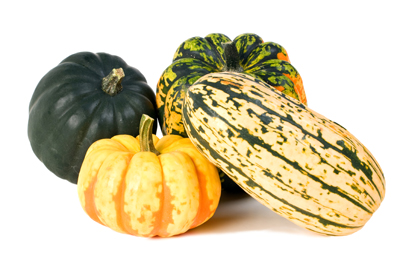
Health Benefits
Winter squash comes in a range of wacky shapes, colors, and textures. From blue-gray kabocha squash to the elongated spaghetti squash. They are delicious, easy to prepare, and packed with an army of powerful nutrients. They get their antioxidant and anti-inflammatory properties from beta-carotene (turning it into vitamin A) and a high level of vitamin C. In addition, they are an excellent source of potassium (good for bone health), vitamin B6 (a boost for the immune and nervous systems), and a ton of fiber, which makes them heart-friendly too.
Buy
Look for a squash that is firm and heavy for its size.
Store
Store squash in a cool, dry, dark area. They will keep for several months.
Prepare
There are several ways to prepare winter squash and a multitude of culinary possibilities. First, cut the squash in half, drizzle with a bit of olive oil, add a pinch of salt and pepper, and place cut-side down on a baking sheet. Roast in a 375° oven for 30 to 40 minutes, until you can pierce it with a sharp knife. You can also use a potato peeler to remove the skin and cut the squash into cubes for roasting. Once cooked, the squash can be mashed, pureed, or folded into pasta or risotto. Herbs such as sage and rosemary are a good match for savory butternut squash while warming spices like nutmeg and cinnamon pair nicely if the goal is to bring out its sweetness.
Did you know?
Even though most people identify squash with vegetables, from a botanical standpoint, they are considered fruits because they contain the seeds of the plant.
Read about the amazing health benefits of Artichokes.
